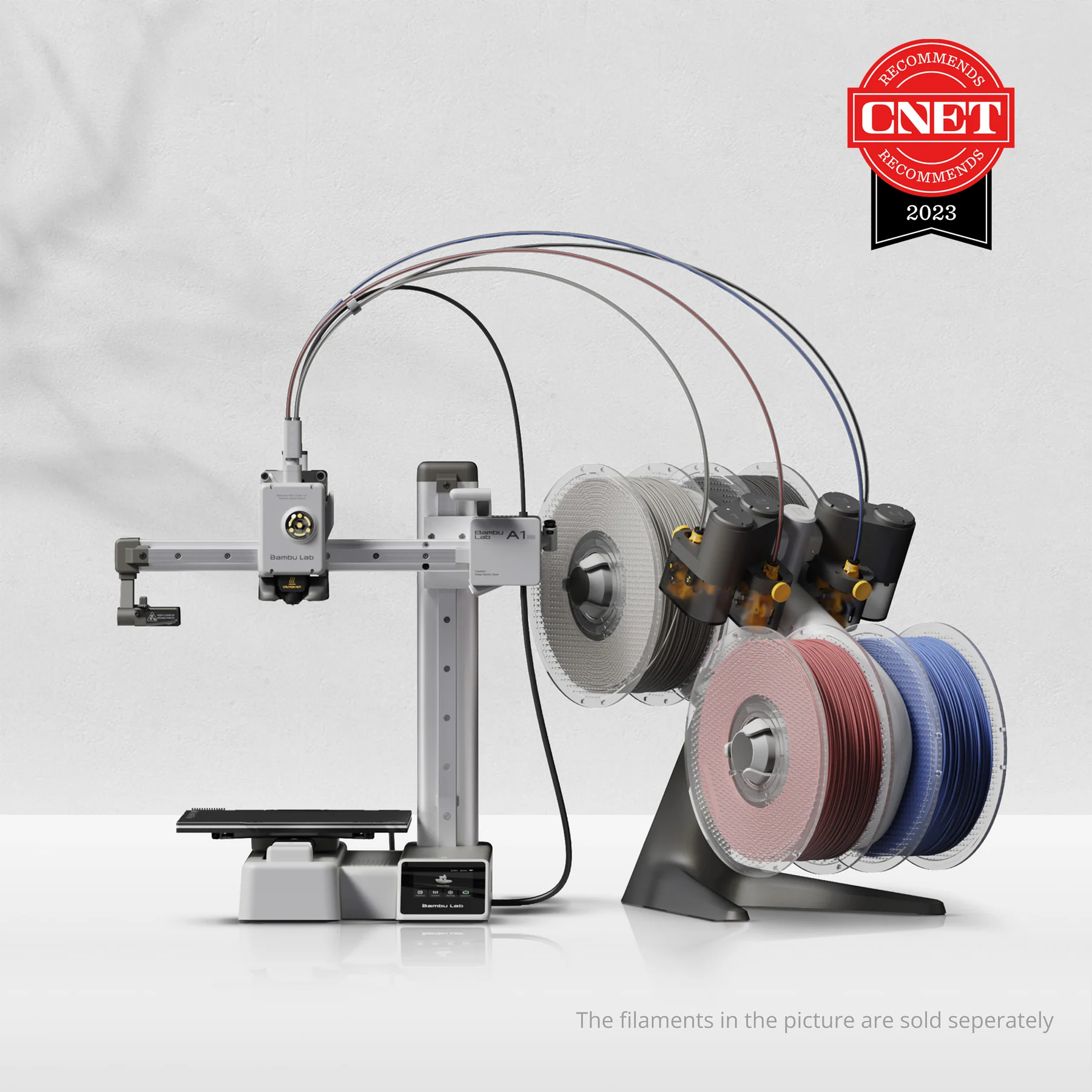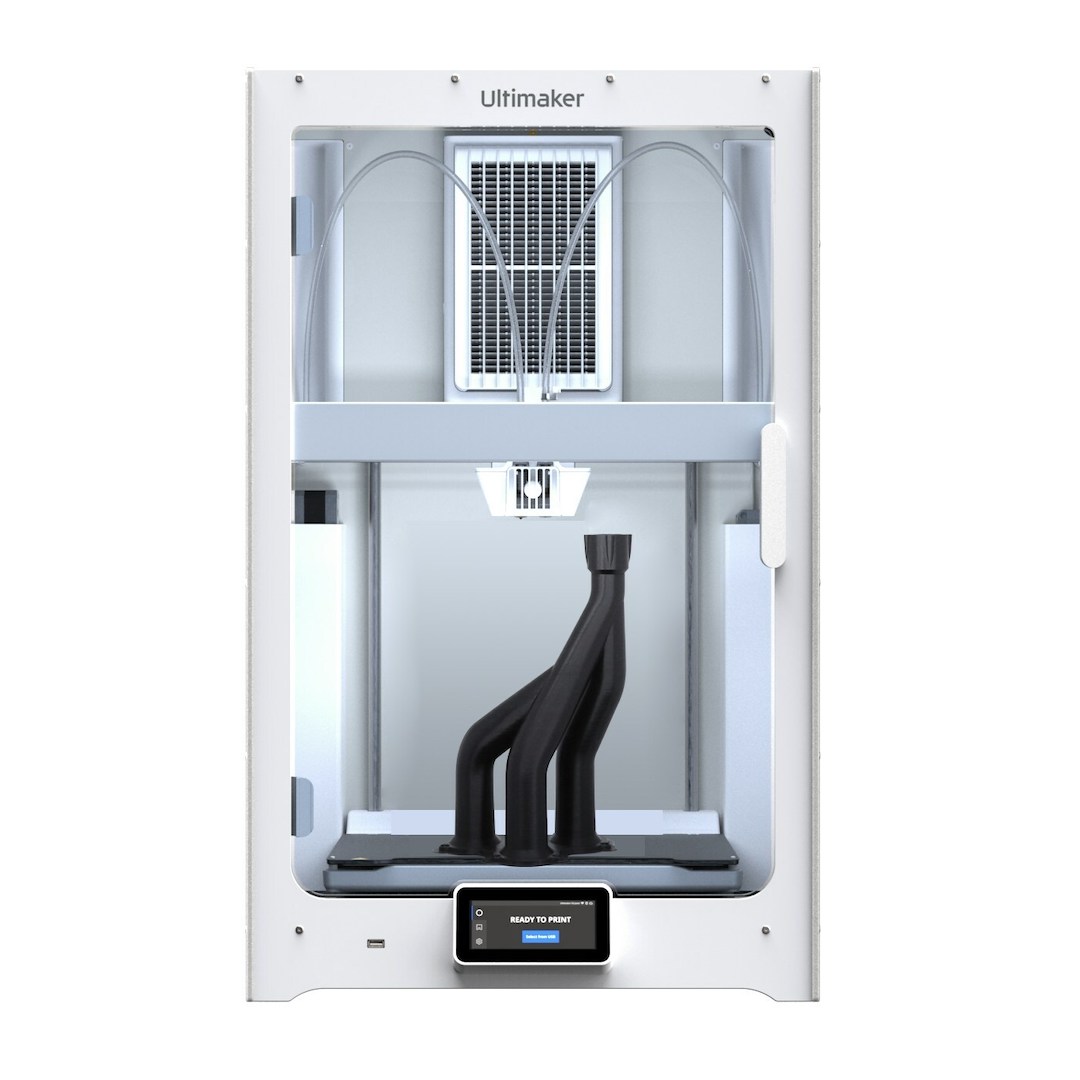Compare A1 Mini vs S7
Comparison between the best 3D printers
Choose the best 3D printer at the best price. The cheapest 3D printers are here.
Buy a 3D printer here with 3D Fila.
 |
 |
|
| Model | A1 Mini |
S7 |
| Printing Material | Filament | Filament |
| Buy Filament for Bambu Lab A1 Mini | Buy Filament forUltimaker S7 | |
| Estimated price | $549,00 | $8300,00 |
| Manufacturer | Bambu Lab | Ultimaker |
| Release Year | 2023 | 2022 |
| Print Volume [mm] | 180x180x180 | 240x330x300 |
| Printer Size [mm] | 315x347x365 | 585x495x800 |
| Weight [kg] | 5,5 | 29 |
| Power Loss Recovery | YES | YES |
| Enclosed printer | NO | YES |
| Bed Leveling | Automatic | Automatic |
| Filament End Sensor | YES | YES |
| Bed type | Heated | Heated |
| Power supply system | Direct Drive | Bowden |
| Standard nozzle | 0,4 | 0,4 |
| Maximum Nozzle Temperature [°C] | 300 | 280 |
| Maximum Bed Temperature [°C] | 80 | 120 |
| Maximum printing speed [mm/s] | 500 | 180 |
| Filament holder | YES | YES |
| Camera for supervision | YES | YES |
| Recommended filaments | PLA, PETG, TPU, PVA | PLA, ABS, PETG, PC, Nylon, Tritan, PP |
| Recommended slicers | Bambu Studio, Super Slicer, Cura, Prusa Slicer, Orca | Cura |
| Maximum Resolution [mm] | 0,1 | 0,1 |
| Processor | 32-bit Silenciosa | |
| Display | Touchscreen 2,4'' | Display touchscreen 4,7'' |
| Power Supply | 150 W | 500 W |
| Connectivity | Wifi, Bambu bus, Cartão SD | USB / Wi-Fi |
| Operating systems | Windows, Linux, Macbook | Windows, Mac, Linux |
| Date of registration in the system | 2024-04-10 | 2023-01-28 |
| Release date | 2023 | 2022 |
| Extra features | The Bambu Lab A1 Mini stands out not only for its impressive speed and automatic calibration, but also for its multi-color printing capability thanks to AMS Lite. This innovative system makes multi-color printing easy, making it accessible to everyone. AMS Lite, specific to the A1 Mini, supports up to four different materials simultaneously, providing creative freedom without complications. With comprehensive sensors for energy monitoring and recovery, a camera for timelapses and Wi-Fi control, the A1 Mini and AMS Lite together offer an intuitive and advanced 3D printing experience, ideal for materials such as PLA, PETG and TPU, and designed for simplicity and fast maintenance with quick-change nozzles. | The UltiMaker S7 printer features a series of technological innovations to enhance 3D printing. It incorporates a flexible, magnetic build plate with PEI coating, promoting better adhesion and easier part removal. Its new inductive sensor significantly improves bed leveling, ensuring perpendicular and accurate prints. In addition, the S7 has a higher quality camera for remote monitoring, an integrated air filter, and uses a unique glass door to maintain a constant temperature in the print chamber. The machine is also compatible with the expansion kit for metal printing. |
| Support for multiple colors and materials (AMS and CFS) | YES | NO |
Notes * |
||
| Cost-benefit | 7 / 10 | 1 / 10 |
| Hardware | 4.2 / 10 | 3.6 / 10 |
| Tela | . | . |
| Print volume | 3 / 10 | 4 / 10 |
| Performance | 4 / 10 | 1 / 10 |
Conclusion |
| In comparing the Bambu Lab A1 Mini and the Ultimaker S7, several key factors reveal distinct advantages and disadvantages for potential buyers. The A1 Mini emerges as a standout option for enthusiasts or small-scale users seeking high-speed printing and versatility at an accessible price point. Its innovative features, such as multi-color printing capability through AMS Lite, make it particularly appealing for creative projects. Additionally, the printer's lightweight design, compact size, and automatic calibration contribute to user-friendliness and ease of maintenance. The A1 Mini offers an impressive maximum print speed and a variety of recommended filaments, which cater well to hobbyists looking to explore different materials without the complications often associated with 3D printing. Its overall cost-benefit ratio reflects its efficient performance and affordability. Conversely, the Ultimaker S7 is targeted towards professional users and more complex applications. While it carries a significantly higher price tag, it justifies this with an array of premium features, such as an enclosed print chamber, a flexible build plate for easier removal, and advanced monitoring capabilities, including a superior camera and integrated air filtration system. The S7 is designed for reliability and quality, capable of handling a wider range of materials, including specialty filaments, which makes it better suited for industrial applications. However, the investment in an Ultimaker S7 may be less favorable in terms of cost-to-performance ratio, especially for users primarily interested in hobbyist practices. In conclusion, choosing between the Bambu Lab A1 Mini and the Ultimaker S7 ultimately hinges on budget, intended use, and material needs. For those seeking an economical and efficient solution for general 3D printing tasks, the A1 Mini is the superior choice. However, for users who require advanced capabilities, higher quality results, and professional-grade features, the Ultimaker S7 represents a worthwhile investment despite its higher price. |

